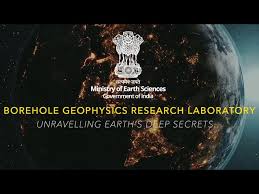Borehole Geophysics Research Laboratory:

Borehole Geophysics Research Laboratory is executing India’s scientific deep drilling programme in Karad, Maharashtra.
- Borehole Geophysics Research Laboratory (BGRL) in Karad, Maharashtra, is a specialised institute under the Ministry of Earth Sciences mandated to execute India’s sole scientific deep-drilling programme.
- Under BGRL, the aim is to drill the earth’s crust to a depth of 6 km and conduct studies to help expand the understanding of reservoir-triggered earthquakes in the Koyna-Warna region of Maharashtra.
- This region has been experiencing frequent earthquakes since the Shivaji Sagar Lake, or the Koyna Dam, was impounded in 1962.
- BGRL’s 3-km-deep pilot borehole in Koyna is complete; the Ministry of Earth Sciences is committed to reaching a depth of 6 km.
- It employs a unique drilling strategy—a hybrid of mud rotary drilling and air hammering.
- Scientifically drilled boreholes can be a hub of direct, unique in situ experiments and observations and monitor a region’s fault lines and seismic behaviour.
- They also provide exact and fundamental knowledge of the composition of the earth’s crust, structure, and processes, and help validate models based on surface studies.
- Thus, it can inform a range of societal problems related to geohazards and geo-resources.




